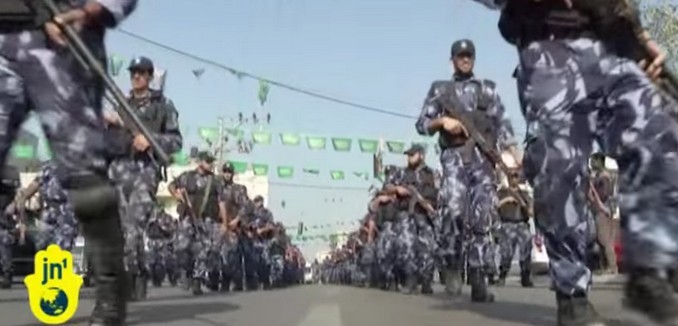Palestinian journalists operating in both Gaza and the West Bank are subject to high levels of intimidation, according to a report published Tuesday in Al-Monitor. The report cited a study by the Palestinian Center for Development and Media Freedoms from 2014, which “found that 80% of Palestinian journalists in the West Bank and Gaza practice self-censorship of their writing.”
Journalist Ghazi Bani Odeh, who conducted the survey, “The Official Media and Freedom of Expression,” told Al-Monitor that attacks and harassment, and thus fear of them, are the main causes leading journalists to censor themselves.
He told Al-Monitor, “There is no difference between the violations [against journalists] committed in the West Bank and those committed in Gaza, as journalists are equally suppressed, thus leading them to examine every word they write.”
Al-Monitor cites a number of examples of this intimidation, one of which took place last month.
Mohammed Othman, a freelance journalist who writes for Al-Monitor, was physically assaulted and threatened at the headquarters of the Popular Resistance Committees (PRC) on Jan. 5. According to Othman, he had published a report about the killing of people accused of collaborating with Israel during the 2014 war. After publication of the report on the web, which contained information provided by a PRC spokesman, the spokesman asked Othman to withdraw the statements. When he refused, he was assaulted. Othman said, “Due to pressure and fear for my safety, Al-Quds TV decided not to publish the video of the interview [with the spokesman] after I was attacked.”
The effect of the intimidation, which includes “actual shootings and beatings” in both the West Bank and Gaza, is such that “journalists who do not censor themselves might be taken for troublemakers or nonprofessional journalists.”
Khaled Abu Toameh reported today that recently the “Islamic State terror group appears to have joined the Palestinian Authority [PA] and Hamas in their campaign to silence Palestinian journalists.”
70% of Palestinians surveyed in a poll in December said that they could not criticize PA President Mahmoud Abbas.
In Why Everything Reported from Gaza is Crazy Twisted, which was published in the August 2014 issue of The Tower Magazine, Mark Lavie points out that this is hardly a new problem.
Besides the budgetary limitations, news organizations often hesitate to send reporters into Gaza at all because of the constant danger, and not from Israeli airstrikes. In 2007, BBC reporter Alan Johnston was kidnapped by Palestinian militants and held for more than three months. Many other foreign journalists were kidnapped there and held for a day or two around that time. There have been no kidnappings recently, but the message was clear—foreigners are fair game. The message was heard and understood. For lack of an alternative, news organizations began to rely more and more on local stringers, giving the regime considerable leverage through intimidation. It’s expected that news organizations will deny all this—it’s part of the dance.
On many occasions, frightened stringers have pleaded to have their bylines taken off stories. Some have been “evacuated” from Gaza for a time for their own safety, after an article critical of the regime was published or broadcast. Families have been spirited out for a while.
So when the stringer returns home and gets back to work, it’s pretty clear how he’ll behave. Everyone in the home office knows that and accepts it.
[Photo: JewishNewsOne / YouTube ]




